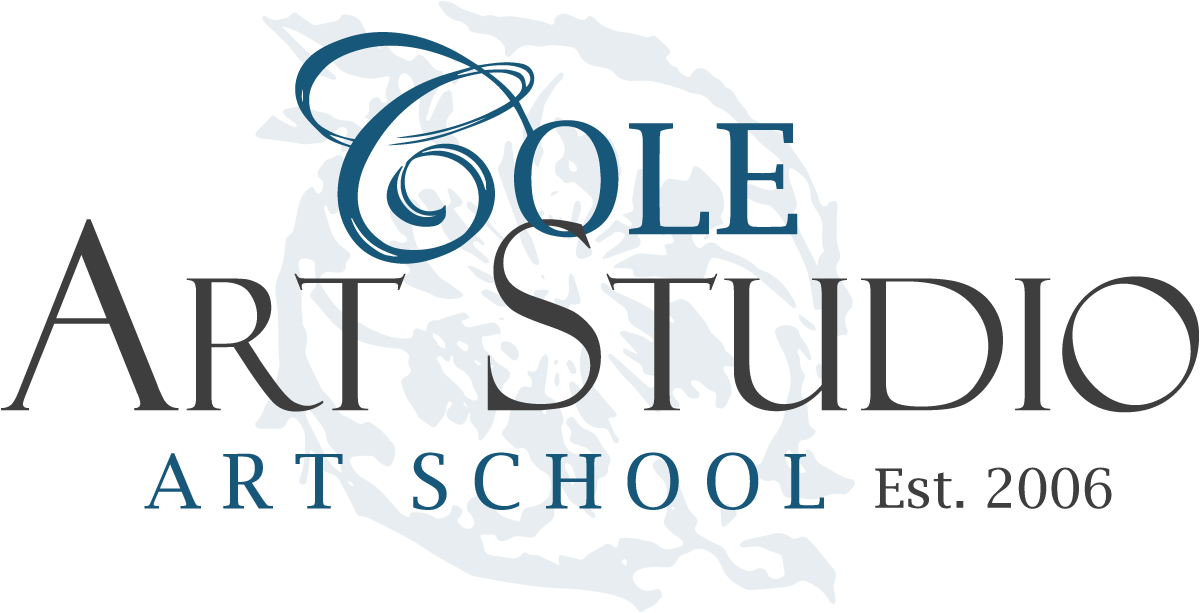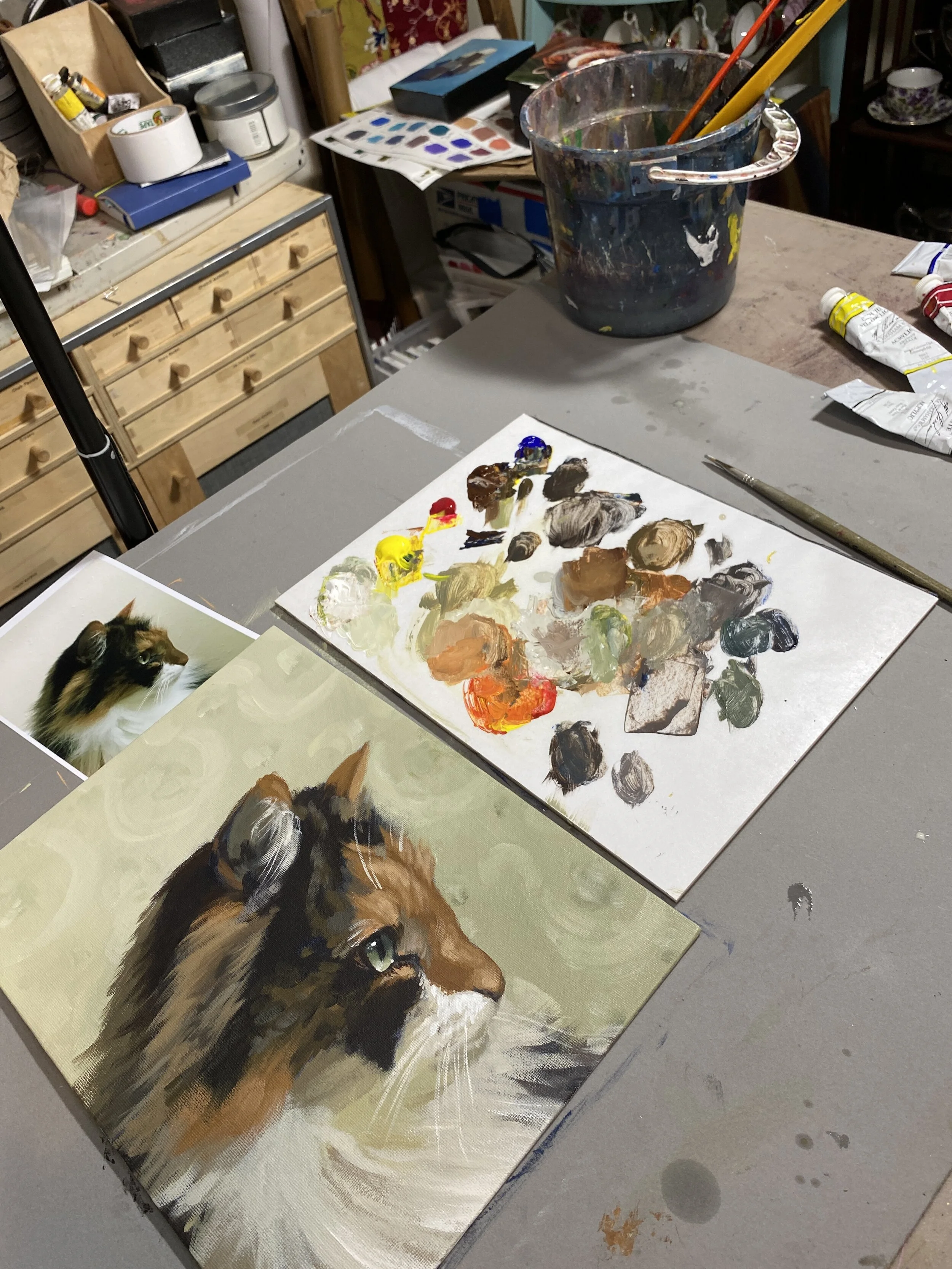VIDEO DEMO: Painting a Calico Cat in Acrylic w/ Angela Bandurka - 365 Days of Access: All Levels
VIDEO DEMO: Painting a Calico Cat in Acrylic w/ Angela Bandurka - 365 Days of Access: All Levels
Offered at an exclusive, introductory rate for the holidays!
WATCH THE ENTIRE PROCESS FROM DRAWING-TO-GRISAILLE-TO-PAINTING
Video Demonstration! All Levels Welcome!
This is a video demonstration that takes you through the steps of drawing the basic shapes, creating a grisaille (a black-and-white version of the cat to find your values), then painting on top of the grisaille in color. Both the painting and the palette are viewed at all times throughout this process. Once you purchase the video, you will be guided to a link to download a PDF with instructions on how to access the video and photo download. You have 24 hours to download the documents, which will grant you (or a named recipient) access for at least 365 days. (Note: for those giving this as a gift, that date will begin from the date of receipt by the person being gifted.)
More information is below:
The best thing about purchasing a self-study course is that you will be able to work in your own time, watching the video at your own pace. It’s all about practice, that’s the key to improving your skills! While this video shows a process done in acrylics, Angela does talk about what you’d do differently if painting in oils, so you can use either medium. Note that this video demo does not include any class time with Angela.
What’s Included in this Demo:
Photo Downloads:
Color Photo. You’ll be able to print out the photo of the cat to use in your own practice*
Video Demo:
Start-to-Finish Demonstration Length of video: 1:24:34 (1 hour, 24 minutes, 34 seconds)
The Supply List
Also available at https://www.dickblick.com/lists/blicku/JPXA20GPJT3O3/publicview/, scroll to the bottom for videos talking about the supplies.
For students working in ACRYLIC: Angela will be using M. Graham paints, though Golden or Liquitex Professional will work as well. Be sure to use professional-grade paints, not student or hobby level.
Titanium White
Cadmium Yellow Light
Quinacridone Rose (alternate could be Alizarin Crimson Permanent or Quinacridone Red)
Ultramarine Blue
Burnt Umber
Palette: Disposable paper palettes work well; palette must be flat with no little wells or indents. Some students may wish to use a stay-wet palette (this is not something Angela uses but helps keep the paint wet longer for students who are in hot/dry regions.)
Brushes: All are long-handled brushes. There are no industry-wide standards on sizing, so Angela has given a general sizing guide below. Some brands she likes are Princeton, Simply Simmons, and Royal Langnickel Zen (silver handle) brushes. Only use synthetic bristles for acrylic painting - stiffer than a watercolor brush.
About a one-inch sized filbert or bright brush
One 1/4-inch filbert brush
One 1/2-inch filbert brush
One round brush, small-to-medium-sized (if it has a nice point to it, size doesn’t matter too much.)
Optional: One script liner brush (any small size will work, such as 1, 0, or 00, but the key is that the bristles need to be long!)
Other:
Paper Towels
Canvases or canvas panel: between 9x12 and 11x14 inches
Tabletop or standing easel
Palette Knife for mixing paint
Optional: Clear acetate sheet
For Students working in OIL: Angela will be using M. Graham paints, though Gamblin will work as well.
Titanium White
Cadmium Yellow Light
Quinacridone Rose (alternate could be Alizarin Crimson Permanent or Quinacridone Red)
Ultramarine Blue
Burnt Umber
Palette: Although disposable paper palettes work, Angela recommends a permanent palette to keep the oil paints for longer, such as wood, plastic, or glass. Whatever you get, the palette must be flat with no wells or indents.
Mediums: the 4 oz size is fine for these:
Walnut Oil (for cleaning your brushes during the painting process, or select odourless mineral spirits)
Walnut Alkyd Medium (or any other fast dry medium)
Glass or metal container with lid for the walnut oil
Brushes: All are long-handled brushes. There are no industry-wide standards on sizing, so Angela has given a general sizing guide below. Some brands she likes are Princeton, Simply Simmons, and Royal Langnickel Zen (silver handle) brushes.
About a one-inch sized filbert or bright brush
One 1/4-inch filbert brush
One 1/2-inch filbert brush
One round brush, small-to-medium-sized (if it has a nice point to it, size doesn’t matter too much.)
Optional: One script liner brush (any small size will work, such as 1, 0, or 00, but the key is that the bristles need to be long!)
Other:
Paper Towels
Canvases or canvas panel: between 9x12 and 11x14 inches
Tabletop or standing easel
Palette Knife for mixing paint
Optional: Clear acetate sheet



